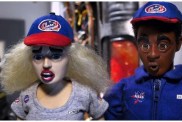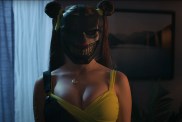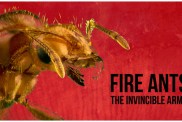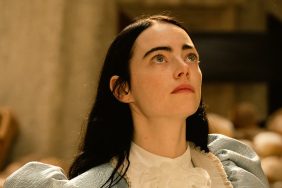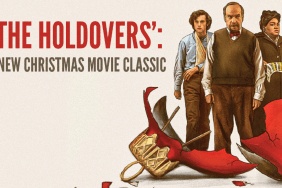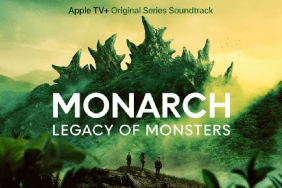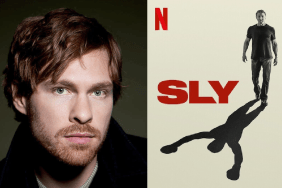
Canadian composer Mark Korven discusses sculpting the sound of THE WITCH.
THE WITCH is one of the more deservedly acclaimed debuts in recent memory, a creepy period parable of loneliness, isolation, witchcraft, religious hysteria, and the monstrous feminine. A layered historical piece, its the mesmerizing score from Canadian composer Mark Korven that makes the films slow burn sequences squirm, creating moments of sometimes unendurable tension.
Subtitled A New-England folktale, THE WITCH is the feature film writing/directorial debut of Robert Eggers. The setting is the harsh untamed landscape of 1630s Massachusetts (actually, the desolate greyscapes outside Mattawa, northeastern Ontario). A Puritan family is ostracized from their settler community over disputes of faith. Proud father William (Ralph Ineson, with an intoxicating gravel voice), chooses exile over acquiescence, and departs with his wife Katherine (Kate Dickie), eldest daughter Thomasin (Anya Taylor-Joy), son on the cusp of puberty, Caleb (Harvey Scrimshaw), bratty twins Mercy and Jonas, and baby Samuel. Practitioners of a joyless and unalterable religious doctrine flush with original sin, they work their stark plot of land in total isolation, surrounded by an ominous and unknown forest. They dont know it yet but something evil lives there.
When the baby disappears from right under Thomasins nose (literally), the panic that follows is only the beginning of the familys trials and afflictions, a brooding onslaught of desperation, depression, death, paranoia, crop failure, moral failure and questions of faith. Most witch tales set in this time and place (like THE CRUCIBLE) focus on the escalating mania within a community. But here the community is gone, detached, uninterested. All thats left is fear, faith and family. And in this version of history, witchcraft and all its supernatural trickery is also tragically, soberly real.
Another recent directorial debut and sleeper hit that comes to mind is Jennifer Kents THE BABADOOK, which worked well enough as a fright flick but really left you winded from the exhaustion of a sleep-deprived widow and her uncontrollable trouble child, and the tenuous, painful bond between them (if THE BABADOOK didnt work for you, revisit it once you have children). Likewise, THE WITCH manipulates the trappings of the horror genre to achieve bigger, broader aims. The plight of Americas early European settlers is made painfully real and knowable thanks to a believable and smartly researched script, remarkably good casting, claustrophobic exteriors. Theres nowhere to go, no help, no resources, no outsiders. Despite some arguable final act missteps, THE WITCH is a potent film. But its absolutely the music that seals it as a modern classic.
Mark Korven has been composing music for film and television for almost 30 years, and for almost every conceivable genre. He is the longtime regular composer for Toronto documentary specialists White Pine Pictures, but horror/thriller fans will know him best from his work for Vincenzo Natalis impressive Canadian-shot indie runaway hit, CUBE (1997). Korvens collection of exotic world instruments is remarkable and I strongly recommend listening to his solo loop work using the Sarello, a cello/sarangi hybrid that Korven co-designed.
To my ears, THE WITCH is one of the most haunting and mesmerizing scores in recent memory. It dispenses with both classic orchestration and the retro-revival minimalist synth pulses that the reissue vinyl market is clamoring for. Instead, it takes instruments that might be at home in the time period of the film, but yanks from them all the wrong notes, whipped and choking and screaming. Percussive slapped hands match the witchs strokes as she mashes the remains of a victim with a mortar and pestle. Strings oscillate like swarms of locusts. And youll never look at a field rabbit or black goat quite the same again.
SHOCK TILL YOU DROP speaks with composer Mark Korven on the eve of THE WITCHs theatrical release.

SHOCK: THE WITCH is engrossing, disturbing and convincing. But its the score that gets under the skin and makes the film, at times, a very difficult watch. What attracted you to the project and what were the initial discussions like with director Robert Eggers aims, expectations, fears, things to avoid?
MARK KORVEN: What attracted me to the project was all of the above. With Robert, I’d never met anyone with such a laser clear vision of what he wanted to do. The film was completely visualized before he shot anything. It was all in his head. I was in awe and I wanted to be around that energy, and learn from it. Stylistically, he wanted a completely acoustic score, that was essentially non-melodic and only referenced the time period through the sound of the instruments. No nods to 17th century melody or harmony.
SHOCK: Were there any scores or composers you were by or referencing in your work on THE WITCH? The dizzying strings and dissonant flurry of choral voices, finding an uneasy harmony before a hard scene cut – it made me think of György Ligetis work in 2001: A SPACE ODYSSEY and other mid-century avant-gardists like Stockhausen. The score during Calebs meeting with The Witch, for example, is reminiscent of the moon encounter with the Monolith.
MK: Robert did give me a lot of references, mostly music by Krzysztof Penderecki (Threnody to the Victims of Hiroshima), and a lot of 17th century stuff. But he didn’t want it copied in any way, he just wanted to get the feeling of what he was hearing across to me. We didn’t reference Ligeti from 2001: A SPACE ODYSSEY, but yes, the feeling was definitely similar.
SHOCK: Prior to THE WITCH, your most notable work in the horror/thriller genre is Vincenzo Natales CUBE. Though produced many years apart and certainly very different films, can you compare and contrast the process of scoring THE WITCH and CUBE?
MK: In a way, Vincenzo and Robert were similar. They both wanted non-melodic, textural scores. With Vincenzo, it was very difficult to sell him on the idea of including any melody or harmony at all, and Robert as well. Which I totally respected. They both had very strong visions for their films. I remember Vincenzo telling me, “This may be the only time in my career that I’ll be able to make a film exactly the way I want to with no compromises.” With Robert, it was the same. Both CUBE and THE WITCH were low budget films. But when there’s big money involved, there’s many more people that you have to please. A director’s artistic vision will inevitably get watered down.

SHOCK: The initial impression when listening to THE WITCH is an absence of synthesizers or amplified/electrified instruments, instead hearing sounds that seem to match the time & place of the narrative. On your website, you showcase many world instruments from your collection, including ones you helped invent, like the Sarello. Can you describe any peculiar instruments used for THE WITCH, and why they were chosen?
MK: The main one was the Swedish nyckelharpa. It’s a keyed violin dating back to the 1400s or so. I’d played this instrument for years, but had never found a place for it, so I was thrilled to use it for THE WITCH. In fact, it was the thing that sold Robert on the idea of hiring me in the first place. He just loved the strange medieval sound of it. It just felt right. Also, the waterphone, which is a 20th century instrument a couple of steel serving trays welded together with brass rods around the circumference, and played with a bow, or sometimes used percussively. I play the big daddy, called the MegaBass waterphone. It’s a pretty scary sounding instrument when used in a horror film, with its unearthly squeals and shrieks. I also used it for the big hits, banging it and throwing various shakers on it for extra cacophony.
SHOCK: Can you tell me about upcoming releases of THE WITCH soundtrack? And whats your latest project in the works?
MK: THE WITCH original soundtrack will be available quite soon from Milan Records on CD, and on vinyl in a few months time. I just finished a film from out of NYC called WE’VE FORGOTTEN MORE THAN WE EVER KNEW, an atmospheric post-apocalyptic tale. With lots of melody and harmony!
THE WITCH opens in theaters across USA and Canada, Friday, February 19th.
